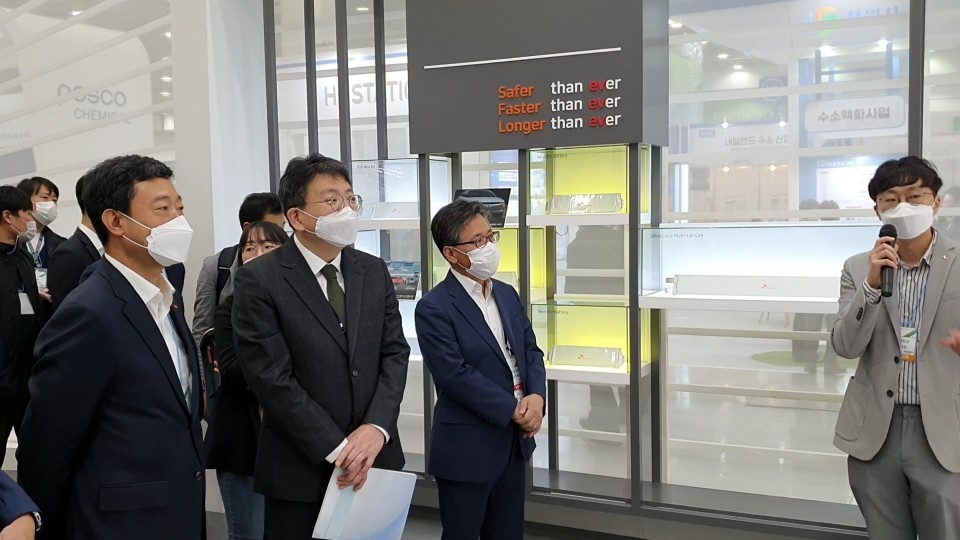[News Focus] SK Innovation’s battery split-off plan called into question
Firm’s not yet profitable battery division compounded by settlement money
By Kim Byung-wookPublished : Feb. 17, 2021 - 16:34

In its self-proclaimed rivalry with LG Energy Solution, SK Innovation has been eyeing a split-off of its battery business with a potential initial public offering, but a major setback in the US could pose a challenge to the plan.
Speaking at a battery expo in Seoul last October, Jee Dong-seob, the Seoul-based company’s battery division chief, said that he was considering the separation from a “financial perspective.”
As a latecomer in the white-hot electric vehicle battery market, SK Innovation has plans to increase its annual battery production capacity from the current 40 gigawatt-hours to 125 gigawatt-hours by 2025. Such aggressive expansion would require capital worth 3 trillion won to 4 trillion won ($2.7 billion-$3.6 billion) every year. By splitting off the battery unit and later debuting it on the stock market, the company would gain access to that much-needed capital.
Though Jee didn’t mention the exact timeline for the reorganization, industry sources predict it will be late 2022 or 2023, by the time the battery division turns a profit.
However, he might have to wait few more years, as its defeat to LG in a lawsuit over intellectual property related to battery technology could dent SK’s bottom line and delay the breakeven point of its battery business.
The low profitability of SK Innovation’s EV battery business is even more pronounced when compared to its immediate competition Samsung SDI.
According to market tracker SNE Research, SK Innovation last year ranked sixth in the global EV battery market by deploying 7.7 gigawatt-hours of electric vehicle batteries and reaped revenue worth 1.6 trillion won.
In the same period, Samsung SDI ranked fifth by selling 8.2 gigawatt-hours of EV batteries, but scored more than twice the revenue -- 3.5 trillion won, according to estimates from multiple analyst reports.
“There’s no other way to explain the huge gap in revenues than SK Innovation offered its EV batteries at lower prices (to secure market share),” an industry source said.
However, SK Innovation denied such claim, saying that “estimates from market trackers have a big difference with actual figures.”
SK Innovation’s strategy of economies of scale hangs by a thread in the US, after the US International Trade Commission on Feb. 10 slapped an import ban on SK Innovation for stealing trade secrets from LG Energy Solution.
The import ban, which prohibits SK Innovation from importing lithium-ion battery products to the US, will effectively derail the operation of the company’s two battery plants -- worth $2.6 billion combined -- under construction in Georgia.
The ban has a grace period of up to four years, so SK Innovation will be able to supply batteries to Ford and Volkswagen for a limited time.
“Considering that battery supply contracts last about six to seven years, SK Innovation will be able to supply batteries to Ford and Volkswagen for two years and six months, respectively, (once the two plants are completed),” SK Securities analyst Park Han-sam said.
SK Innovation’s order backlogs in the US are estimated at 20 trillion won. If the Georgia plants shut down after only a year or two, SK Innovation will lose a huge portion of those orders.
To lift the import ban, SK Innovation would have to settle with LG Energy Solution, which is said to be demanding between 2.5 trillion won and 3 trillion won in compensation. Even if it reached a deal with its rival, the settlement amount would make a major dent on SK’s balance sheet and delay its profitability.
If SK Innovation fails to settle, the matter will head for the US District Court of Delaware, which could order punitive damages up to 200 percent of actual damages.
According to Hana Financial Investment analyst Yoon Jae-sung, SK Innovation is offering 800 billion won in settlement money, but LG Energy Solution has responded by telling SK to come up with a proposition “worth negotiating.”
“SK Innovation can secure cash between 2 trillion won and 3 trillion won by taking its subsidiary SK IE Technology public in the first half of this year, liquidating its stake in SK Lubricants or selling off its gas fields in Peru,” said Hwang Yoo-sik, an analyst at NH Investment & Securities.
“However, as SK Innovation needs about 4 trillion won to proceed with its EV battery expansion, the settlement amount and how it pays the settlement could affect its credit rating, going forward.”
Moody’s report released on Tuesday echoed Hwang’s view, suggesting that ”the potential settlement could lead to sizable cash outlays for SK Innovation.“ The report added, “If SK Innovation makes large payments associated with this settlement, it will strain the company’s credit quality and heighten pressure on its ratings, particularly because the company has little financial buffer at its current rating level.”
By Kim Byung-wook (kbw@heraldcorp.com)


















![[Today’s K-pop] Treasure to publish magazine for debut anniversary](http://res.heraldm.com/phpwas/restmb_idxmake.php?idx=642&simg=/content/image/2024/07/26/20240726050551_0.jpg&u=)